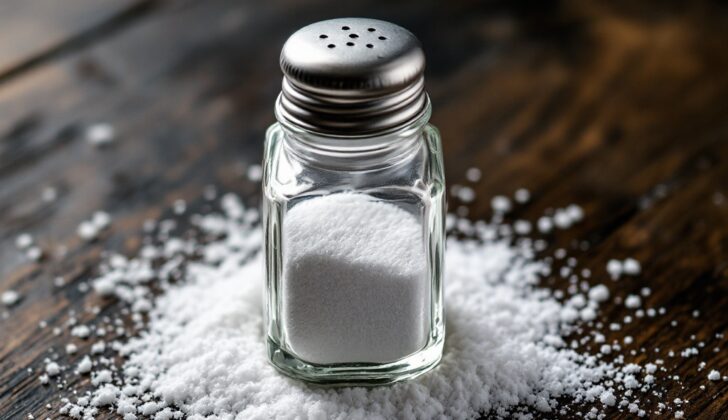What is Iodine Toxicity?
Iodine is an essential nutrient which plays an important part in the body’s metabolism – the various chemical processes necessary for life. It’s used by our bodies to create thyroid hormones, which are crucial for growth, metabolism, and lots of other functions in our bodies. This includes growth and development of the brain in unborn babies and newborns. If a person is not getting enough iodine, this can cause serious issues, such as preventable brain damage in fetuses.
Not getting enough iodine is a recognized global issue. Women who are pregnant and lack enough iodine can develop hypothyroidism — a condition where the thyroid gland doesn’t produce enough hormones, which can result in their baby’s brain development being impaired.
Even though we’ve known about the issues caused by not having enough iodine for a long time, we have not paid as much attention to the problems caused by having too much iodine. Humans can’t make iodine on their own, so we have to get it from foods, supplements, certain medicines, and sometimes from a special type of medical imaging dye. Adults are recommended to get 150 micrograms per day, pregnant women should get between 220 and 250 micrograms per day, and breastfeeding women should get between 250 and 290 micrograms per day. Generally, up to 1 milligram is safe for most people. However, if you consume more than this, for instance through eating too much iodized salt, certain foods or dietary supplements, or over treating iodine deficiency, it can be harmful and lead to toxicity, which is an unhealthy level of iodine in the body.
Having too much iodine can lead to issues with the thyroid, especially in people with existing thyroid problems, older adults, fetuses, and newborns. The effects of high iodine levels can vary from person to person and are closely related to the thyroid’s functioning. High iodine levels can lead to inflammation of the thyroid, hypothyroidism, hyperthyroidism — when the thyroid is overly active, and even a type of thyroid cancer, called thyroid papillary cancer. Symptoms of having too much iodine from consuming it by mouth can range from mild to severe. Mild symptoms can include stomach upset, feeling sick, vomiting, and diarrhea, while severe symptoms can include confusion, extreme tiredness, a state of intense excitement and confusion (delirium), and shock. However, death due to high iodine levels is very rare.
What Causes Iodine Toxicity?
Iodine is usually good for you, but if you consume too much of it, especially through dietary supplements, you might experience iodine toxicity. For iodine to become toxic, you’d need to take in a large amount. That’s because only certain foods have natural iodine – this includes iodized salt, drinking water, milk, some seafoods, and seaweed.
Some types of medications, like amiodarone and potassium supplements, also contain iodine. On top of that, topical antiseptics made from iodine might cause skin irritation, like rashes or blisters. However, if someone swallows these, it could result in serious iodine toxicity.
During the COVID-19 pandemic, some people used nasal sprays with iodine as a preventative measure against the virus. So far, no studies have reported any thyroid problems related to this usage.
Risk Factors and Frequency for Iodine Toxicity
In 2018, the American Association of Poison Control Center’s National Poison Data System recorded instances where people were exposed to certain harmful substances. They reported 1537 individual exposures to dietary supplements, resulting in 58 adverse effects, but thankfully no deaths. Additionally, there were 853 individual exposures to topical iodine, causing 51 adverse effects and, again, no fatalities. Electrolytes and minerals featured prominently as the top 25 substances most commonly involved in human exposures, with a total of 30,046 exposures.
Signs and Symptoms of Iodine Toxicity
If someone accidentally or purposely takes too much of a substance, the first steps are to gather as much information as possible, stabilize the person, and conduct a thorough health check, paying close attention to breathing and blood circulation. A common symptom of severe iodine poisoning could be a burning sensation in the mouth, a fever, or feelings of nausea and vomiting. It’s crucial to continuously monitor vital signs like heart rate and mental status. If necessary, decontamination procedures should be carried out.
Getting expert advice from a poison control center can be useful in these situations. If information about the person’s situation is incomplete or missing, bystanders, family members, or emergency medical teams can provide useful information. Key details to gather in this situation, often referred to as the ‘Five W’s’, include who the person is, what they ingested, when and where the incident happened, and why it happened. The timing, amount, and type of substance taken are particularly important to identify.
Testing for Iodine Toxicity
Following your initial check-up and stabilizing any urgent needs, your healthcare provider should do a thorough examination. They should order a series of laboratory tests, including a complete blood count (CBC), which measures the cells in your blood; electrolyte levels, which determine how well your body’s cells are functioning; and tests for your liver and kidney function. They may also test your thyroid levels, which regulate your metabolism; carry out coagulation tests, which check how well your blood clots; and conduct a pregnancy test if you’re a woman of childbearing age. Additionally, your doctor may test for substances in your blood or urine, and if you are on any medications, check their levels in your body.
They will also do an electrocardiogram (ECG), which is a test that measures the electrical activity of your heartbeat. This is to look for any heart rhythm issues or concerns about QT prolongation, a condition that could lead to a potentially life-threatening irregular heartbeat. They will then compare your ECG results to those of your previous tests, if available.
Lastly, your doctor may request imaging studies like x-rays to identify potentially complicating health issues you might not be aware of, such as aspiration pneumonia (a lung infection that could occur if you accidentally inhale food or saliva into your lungs) or injuries from physical trauma.
Treatment Options for Iodine Toxicity
If a person is thought to have iodine poisoning, the focus of their initial care will be on the basics – maintaining open and effective airways, ensuring their breathing is stable, and maintaining proper blood flow. If they’re serious or critically ill, they will be put on a heart monitor right away and given oxygen. Two large catheters (thin tubes) will be inserted into a vein for emergency access. If their mental state doesn’t allow them to keep the airway open, they may need to have a tube inserted into their throat to help them breathe.
Currently, there are no specific antidotes to iodine poisoning; the main focus is supportive care to help the body recover. If the person is stable, awake, and able to breathe on their own, they may be given activated charcoal. This substance can help to remove the iodine from their digestive system. The person may need to stay in the hospital or the emergency department for a while until the doctors are sure they are medically stable.
What else can Iodine Toxicity be?
When a patient comes in with mild symptoms like upset stomach, nausea, vomiting, and diarrhea, there can be many possible diagnoses. It’s vital for the doctor to get a full and precise history from the patient. This helps the doctor to exclude certain diagnoses and focus on the most likely ones. It’s important to take into account any underlying health conditions, as well as any medications, dietary supplements, or anything else the patient might have eaten or drunk. Treating the patient starts with stabilizing their condition, then providing supportive care. Further evaluation and testing can help to narrow down the diagnosis further.
What to expect with Iodine Toxicity
The 2018 Annual Report of the American Association of Poison Control Centers’ National Poison Data System (NPDS) indicated that there were no recorded deaths due to iodine toxicity in that year. Iodine-induced hyperthyroidism, a condition that arises when the thyroid produces too many hormones, can occur in populations that lack sufficient iodine and have undergone iodine supplementation programs. In such instances, the thyroid may have developed lumps that are resistant to the controlling effects of the thyroid-stimulating hormones. When these lumps are suddenly supplied with iodine, they may produce excess thyroid hormones which can lead to symptoms including weight loss, a rapid heart rate (tachycardia), and muscle weakness. This condition can be particularly risky for those with existing heart conditions.
For individuals who have adequate iodine intake, taking in too much iodine can lead to increased levels of the thyroid-stimulating hormone, which inhibits the production of thyroid hormones, leading to hypothyroidism (underactive thyroid) and goiter (an abnormal enlargement of the thyroid gland). Patients who have a deficiency in iodine and existing thyroid issues might have sensitivity to iodine levels that are considered safe for the general public. Newborns, older individuals, and pregnant women may be more prone to experiences of iodine excess.
Possible Complications When Diagnosed with Iodine Toxicity
Thyroid cancer, the most prevalent and quickly growing hormonal-related form of cancer, is thought to be increasing due to better diagnosis and screening. Some theories suggest an excessive intake of iodine could also contribute to this rise. Changes in iodine intake seem to change the type of thyroid cancer one might get. Still, it remains unclear whether it’s a lack or excess of iodine that heightens overall thyroid cancer risk.
An overabundance of iodine during pregnancy can create problems for both the expecting mother and her unborn child. Mothers might experience a form of understated thyroid deficiency, and the baby could respond in several ways. Available reports suggest that exposure to high iodine levels during pregnancy can lead to the baby’s impaired neurological development and an increased chance of premature birth.
Dangers of Excess Iodine:
- May contribute to the risk of thyroid cancer
- Changes the type of thyroid cancer one may get
- Can trigger a subtle form of thyroid deficiency in pregnant women
- Possible neurological issues in newborns
- A higher chance of premature birth
Preventing Iodine Toxicity
The Agency for Toxic Substances and Disease Registry (ATSDR) delivers advice on educating patients. Generally speaking, most people have very little exposure to iodine. For the majority of us, our main source of iodine comes from our food, like iodized salt. It’s also worth noting that exposure to radioactive iodine tends to be a rare occurrence unless you’re undergoing specific tests or treatments for thyroid disease.
When we talk about iodine, it’s important to remember it can be both good and bad for our health. On the one hand, our thyroid relies on iodine to create thyroid hormones, which keep the body functioning correctly. But on the other hand, being exposed to large amounts of iodine can actually damage the thyroid. This is a delicate balance, which is why it’s crucial to monitor iodine levels, especially in those undergoing thyroid treatments.












